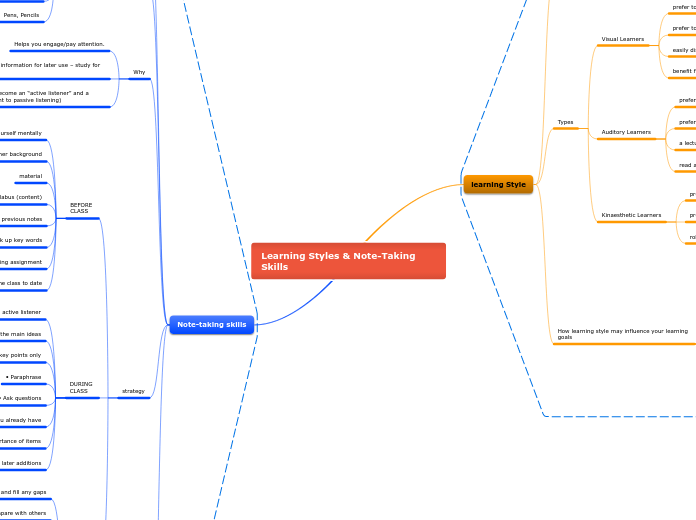Learning Styles & Note-Taking Skills
learning Style
What
Learning style is the ‘way’ we
take in information and develop
our knowledge or skills
Types
Visual Learners
prefer to learn by sight.
prefer to see information such as pictures.
easily distracted without visual aids.
benefit from using charts, maps and notes.
Auditory Learners
prefer to learn by hearing
prefer to hear information; can absorb
a lecture with a little efforts.
read aloud to themselves.
Kinaesthetic Learners
prefer to learn through movement
prefer touch for taking information
role playing help to remember and learn.
How learning style may influence your learning
goals
• Understand how you learn best
• Identify styles that develops your skills
• Identify style that makes your learning ineffective
• Consequently, become an effective learner
• Greater academic success
• Apply right style in right context
• Better time-management
Note-taking skills
What
Writing down ideas from lectures and readings in your
own words
What materials do you need
Loose-leaf paper (Notebook)
Binder for organizing
Folders with pockets to keep things organized
Pens, Pencils
Why
Helps you engage/pay attention.
Notes serve as a “file” of information for later use – study for EXAM!
Taking notes helps you become an “active listener” and a “critical thinker”. (different to passive listening)
strategy
BEFORE
CLASS
Prepare yourself mentally
• Review your notes and other background
material
• Review syllabus (content)
• Review previous notes
• Look up key words
• Review any reading assignment
• Think through what has happened in the class to date
DURING
CLASS
• Be an active listener
• Get the main ideas
• Write key points only
• Paraphrase
• Ask questions
• Integrate with other knowledge you already have
• Use symbols to indicate importance of items
• Leave blank space for later additions
AFTER
CLASS
• Review your notes and fill any gaps
• Discuss/Compare with others
• Ask for any clarification
• Hearing a thing once is not enough. Memory requires review and understanding
• Find answers to any questions remaining unanswered
• Write a brief summary
• Not easy – habit takes time
Review
Methods
Outline Method
Cornell Method
Matrix Method
